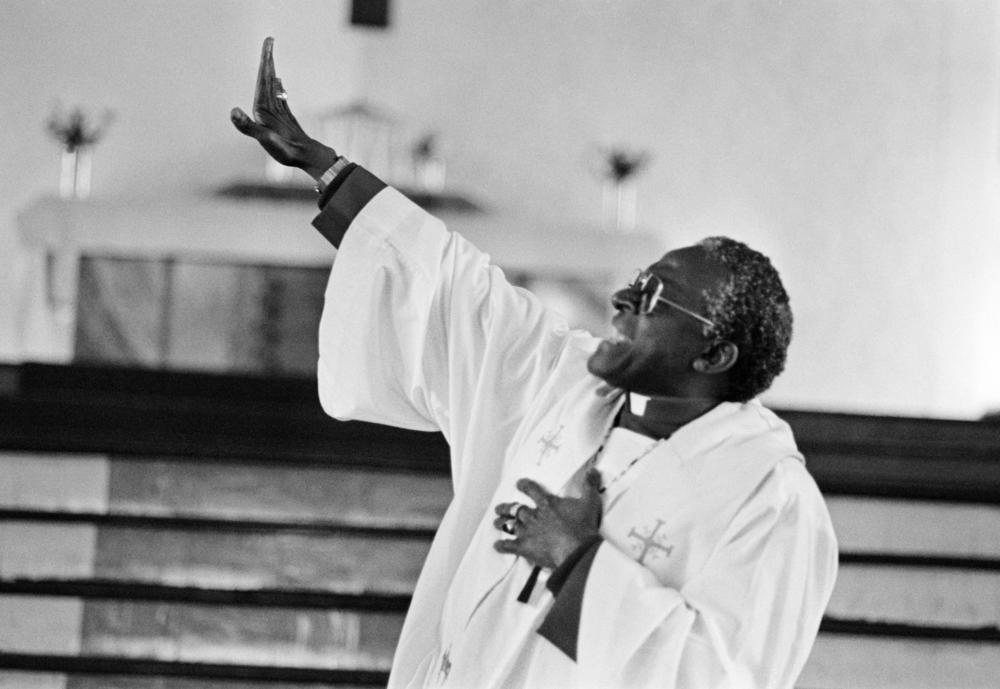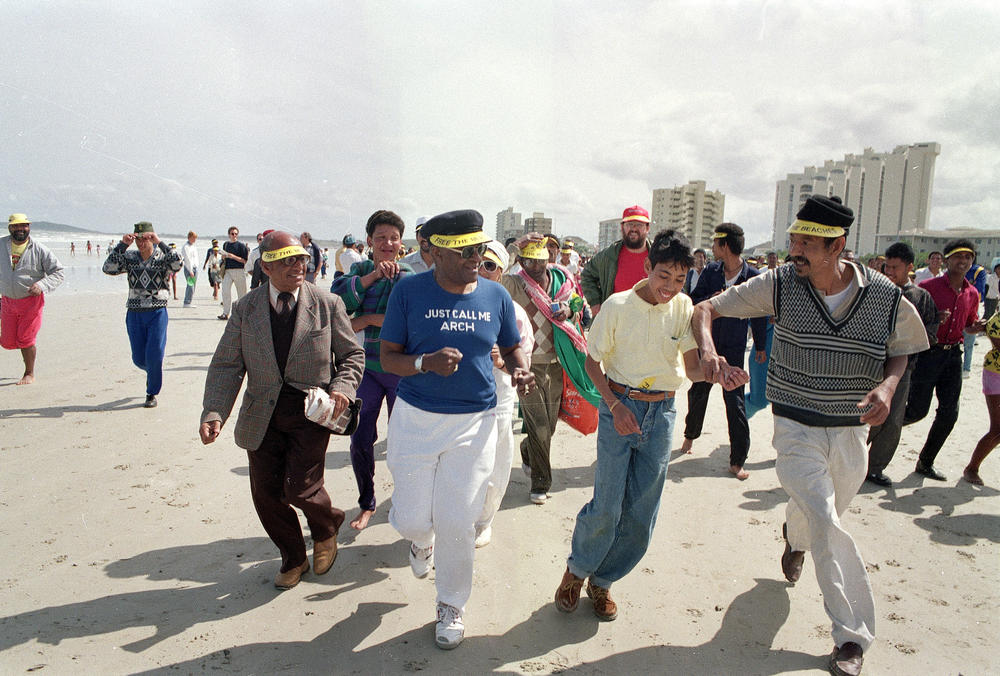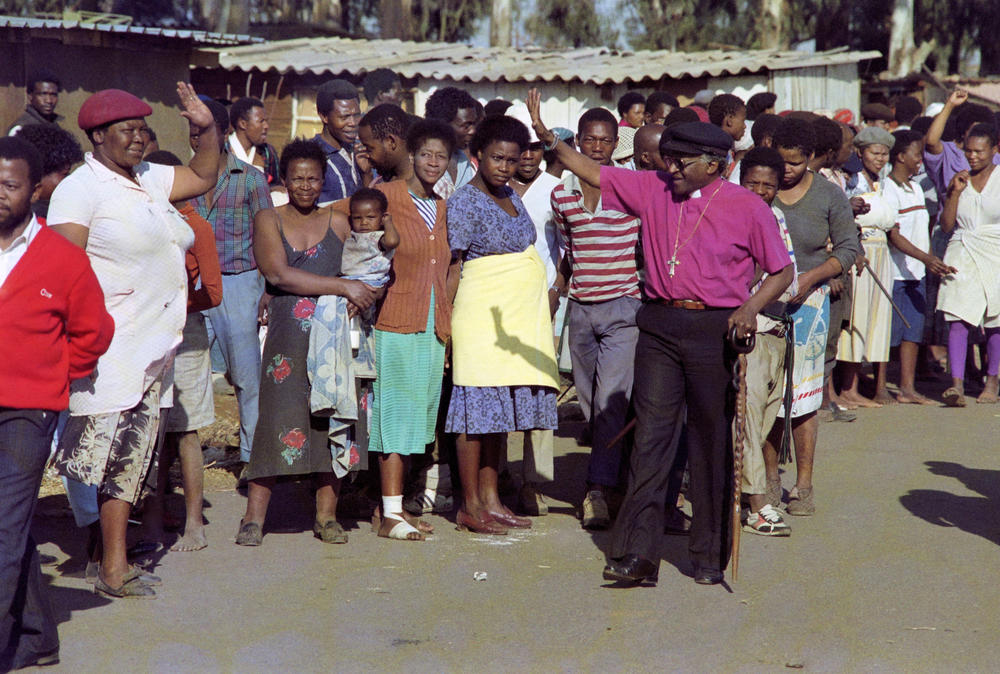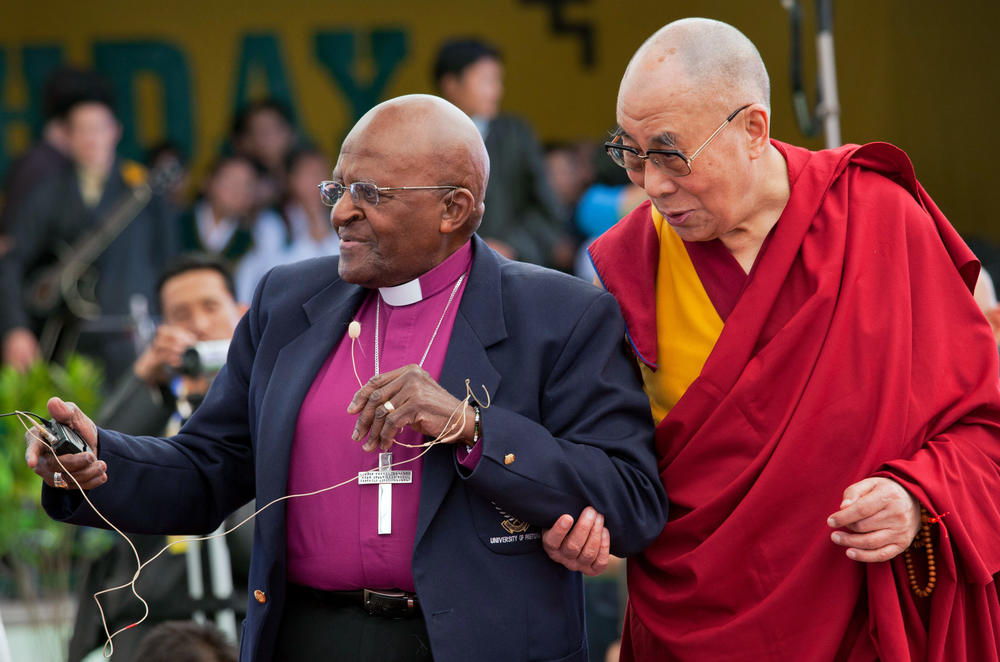Section Branding
Header Content
Desmond Tutu's laugh was contagious. His fight for freedom was deadly serious
Primary Content
Let's start with the laugh.
Desmond Tutu will always be remembered as the South African Anglican cleric who won the Nobel Peace Prize, helped bring down apartheid and served as the moral beacon of a troubled nation for decades. The towering figure has died at age 90.
Yet Tutu's most extraordinary and unique feature was his infectious, cackling laugh, usually triggered by one of his own jokes. He almost always launched his sermons with an amusing tale and, the more fraught the moment, the more likely he was to tap into his endless reservoir of stories to ease the tension.
If his joke fell flat, he would just keep laughing until everyone joined him. Here, have a listen in this video:
I covered South Africa in the late 1980s and early 1990s, which were intense, angry, violent years in a country that often seemed it was edging toward civil war.
Yet time and again, Tutu, dressed in his flowing clerical robe, would appear at a potentially explosive scene and invoke his gift of gab to defuse a crisis, often sending the crowd home with a smile on their faces. His impish grin, laughter and amusing stories were always employed in the service of nudging South Africans to retreat from the precipice of a racial confrontation.
Bringing people together
One of his trademarks was to hold interfaith services at St. George's Cathedral in Cape Town, a city that has a range of Christian denominations, as well as many Muslims and Jews.
At one such event, a Christian preacher cried out to the worshippers, "When are you going to give your life to Jesus?" The mischievous Tutu turned to the Muslim clerics and rabbis seated next to him and said, "I think he's speaking to you."
"He pulled everybody into that cathedral. He never wanted it to be just Christian. He didn't see religion as divisive. In Cape Town, there's a large community of Muslims and Jews, many Christian denominations. He brought them all together," said Sahm Venter, a former reporter who worked with me at The Associated Press at the time and later became a senior researcher at the Nelson Mandela Foundation.
Turning down the flame
In many conflicts, religious figures incite their followers to extreme actions. In contrast, Tutu always invoked his moral authority to turn down the flame and calm a rowdy crowd.
Perhaps the most dramatic episode was his intervention to save a young Black South African from being "necklaced," a gruesome practice in the Black townships where someone accused of collaborating with the White government would have a gasoline-soaked tire forced around their body and set alight.
Tutu came to the rescue as one young man was about to be necklaced. He repeatedly condemned this practice — and all violence — as a means to end apartheid. This position put him at odds with many Blacks, including Nelson Mandela's African National Congress, who argued that some forms of armed struggle were necessary to force the White government to change.
Attempts to discredit him
Even in those final, roiling years of apartheid, South Africa's white government was still trying to discredit Tutu. He always seemed to come out on top.
One day, government operatives rounded up unemployed Black people, gave them pre-printed protest signs and drove them to Tutu's home, a tony estate in the leafy white suburbs of Cape Town. This was Tutu's official residence as the Anglican archbishop. Black workers had allegedly lost their jobs due to international sanctions, and the government wanted media coverage showing that Tutu was actually harming South African Blacks with his calls for sanctions.
When Tutu got wind of this, he raced home, invited the protesters into his garden and turned on the charm. By the time the television cameras arrived, the protest signs had been discarded on the sidewalk and everyone was enjoying tea, cookies and the gracious host at his impromptu garden party.
If South Africa had been a democracy in Tutu's younger years, he might have been a comedic actor. He loved telling drawn-out tales with his eyes wide and his face full of mirth. By the time he reached the punchline, he was often cracking himself up with his maniacal laugh.
But in the tightly circumscribed world of apartheid, few career options were open to him. The son of a high school principal, he first tried teaching but found the Black education system imposed by the white government to be insulting.
So, in 1961, he was ordained as a priest, perhaps the only outlet that gave him a platform, an audience and the opportunity to speak with relative freedom beyond the control of the government. He went on to become the first Black South African appointed dean of St. Mary's Cathedral in Johannesburg in 1975, then bishop, and eventually the country's first Black archbishop.
He never saw himself as a politician and regarded himself as a proxy during the long years when Nelson Mandela and other leaders of his African National Congress movement were in jail or in exile.
Yet Tutu played an incredibly valuable role. Since he was such an international figure, and winner of the 1984 Nobel Peace Prize, the white government could try to undermine him, but it could not silence him.
He gave the anti-apartheid movement a guiding light at a time it would have otherwise been largely leaderless and was in danger of being taken over by angry young men rather than the more restrained elder statesmen epitomized by Mandela and Tutu.
When Mandela and his fellow ANC leaders emerged from prison in 1990, Tutu stepped aside, just as he had always promised, yet remained a powerful moral voice.
Mandela and Tutu both had homes for many years on Soweto's Vilakazi Street, perhaps the only street in the world that could claim two Nobel Peace Prize winners as residents.
Tutu led the Truth and Reconciliation Commission. He spoke out against corruption in the Black-led government just as he had against the white-led government. He spoke out against Black South Africans behaving badly toward migrants from other African nations, reminding them how African countries had offered shelter to Black South Africans during the apartheid years.
He became an elder statesman and a global ambassador often appearing with the Dalai Lama.
He criticized the South African government for not providing a visa to the Dalai Lama in 2011 so he could attend Tutu's 80th birthday party. He accused the government of "kowtowing" to China.
When South Africa buried apartheid with its first all-race election in 1994, Tutu danced with joy as he cast his ballot. He called it "a religious experience, a transfiguration experience, a mountaintop experience."
But in 2013, he said he could no longer vote for the ANC.
"The ANC was very good at leading us in the struggle to be free from oppression," Tutu wrote in an op-ed. "But it doesn't seem to me now that a freedom-fighting unit can easily make the transition to becoming a political party."
As the country held national elections in May 2014, Tutu told South Africa's Sunday Times newspaper: "I didn't think there would be a disillusionment so soon. I'm glad that [Mandela] is dead. I'm glad that most of these people are no longer alive to see this," a reference to a host of chronic problems such as corruption and poverty.
After Tutu's death on Sunday, the current Anglican archbishop of Cape Town, Thabo Makgoba, released a video statement:
"His legacy is moral strength, moral courage and clarity," Makgoba said. "He felt with the people. In public and alone, he cried because he felt people's pain. And he laughed — no, not just laughed, he cackled with delight — when he shared their joy."
Copyright 2021 NPR. To see more, visit https://www.npr.org.





